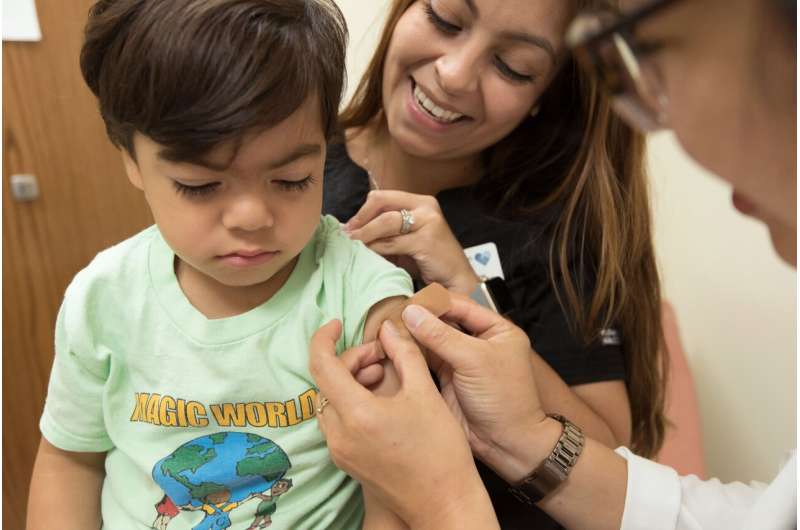Moderna COVID vaccine safe, comparably effective in preschoolers

Two doses of the Moderna COVID-19 vaccine were safe in children aged six months to five years and triggered similar immune response and protection against infection as that seen in young adults, according to preliminary results from a phase 2/3 clinical trial published yesterday in the New England Journal of Medicine.
Emory University and Moderna researchers led the study, of which part 1 was an open-label trial to select the optimal Moderna mRNA-1273 vaccine dose, and part 2 was an observer-blinded, placebo-controlled evaluation of the selected dose in young children through Feb 21, 2022. The study took place during SARS-CoV-2 omicron variant predominance.
The researchers randomly assigned children aged six months to five years in a 3:1 ratio to receive either two 25-microgram (μg) doses of the vaccine or a saline placebo 28 days apart to evaluate the safety and immune response of the vaccine and determine whether the immune response was as robust as that in adults aged 18 to 25 years participating in a related phase 3 trial.
Part 2 of the trial included 3,040 children two to five years old and 1,762 children aged six to 23 months randomly assigned to receive the vaccine and 1,008 children two to five years old and 593 children aged six to 23 months assigned to placebo. Median follow-up after the second dose was 71 days in the two- to five-year-old group and 68 days in the six- to 23-month-old group.
A total of 76.5% of participants in the two- to five-year-old group were white, 14.2% were Hispanic, 6.0% were Asian, and 4.5% were Black. In the younger age-group, 78.9% were white, 13.2% were Hispanic, 4.9% were Asian, and 3.1% were Black. The authors acknowledged the underrepresentation of Black children.
Serious adverse reactions rare
Both local and systemic adverse reactions were more common among vaccine than placebo recipients but were mostly mild and short-term. Fever was more common after the second vaccine injection and lasted about one or two days after either injection in both age-groups. By day 28 after the first or second injection, the incidence of unsolicited adverse events was comparable in the vaccine and placebo groups in both age-groups.
The incidence of adverse events that the investigator considered related to vaccine or placebo was higher among vaccinees than placebo recipients (9% among two- to five-year-olds and 17% among six- to 23-month-olds vs 8% among two- to five-year-olds and 12% among six- to 23-month-olds, respectively) but was generally lower than that seen in adults, teens, and older children.
There were no deaths or cases of myocarditis (inflammation of the heart muscle), pericarditis (inflammation of the thin tissue surrounding the heart), or multisystem inflammatory syndrome in children (MIS-C).
On day 57, neutralizing antibody geometric mean concentrations were 1,410 (95% confidence interval [CI], 1,272 to 1,563) in the two- to five-year-old group and 1,781 (95% CI, 1,616 to 1,962) in the six- to 23-month-old group, compared with 1,391 (95% CI, 1,263 to 1,531) among 18- to 25-year-olds who had received two 100-μg doses of the vaccine. Two vaccine doses elicited robust binding antibody responses to the wild-type strain and the beta, delta, and omicron variants.
Among the 2,594 two- to five-year-olds, there were 119 (4.6%) COVID-19 infections in the vaccine group and 61 infections among 858 placebo recipients (7.1%). In the six- to 23-month-old group, there were 51 COVID-19 infections among 1,511 participants (3.4%) in the vaccine group and 34 cases among 513 participants (6.6%) in the placebo group.
Estimated vaccine efficacy (VE) against primarily omicron COVID-19 was 36.8% (95% CI, 12.5% to 54.0%) among participants aged two to five years and 50.6% (95% CI, 21.4% to 68.6%) among those six to 23 months. The study did not assess the long-term durability of vaccine protection.
Among 18- to 25-year-old participants from the earlier trial, which was conducted before the delta and omicron variants predominated, there were 71 infections among 2,594 participants (2.7%) in the vaccine group and 43 among 858 participants (5.0%) in the placebo group. Estimated VE was 46.4% (95% CI, 19.8% to 63.8%).
Continuing safety surveillance
The U.S. Food and Drug Administration has approved the Moderna vaccine for adults, and it granted emergency use authorization for Americans six months to 17 years in June 2022.
"In children six months to five years of age, two 25-μg injections of the mRNA-1273 vaccine had acceptable reactogenicity, safety, and effectiveness during a period when omicron was the predominant circulating variant, a finding consistent with that observed previously in children six to 11 years of age, adolescents, and adults," the researchers wrote.
The authors said that they will continue active and passive safety surveillance in large global safety networks to detect any new safety issues. "The longer-term effectiveness and durability of mRNA-1273 will also continue to be assessed in clinical trials and through its postauthorization use," they wrote.
More information: Evan J. Anderson et al, Evaluation of mRNA-1273 Vaccine in Children 6 Months to 5 Years of Age, New England Journal of Medicine (2022). DOI: 10.1056/NEJMoa2209367


















